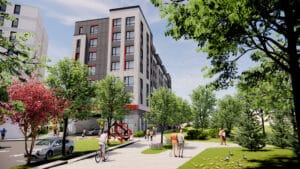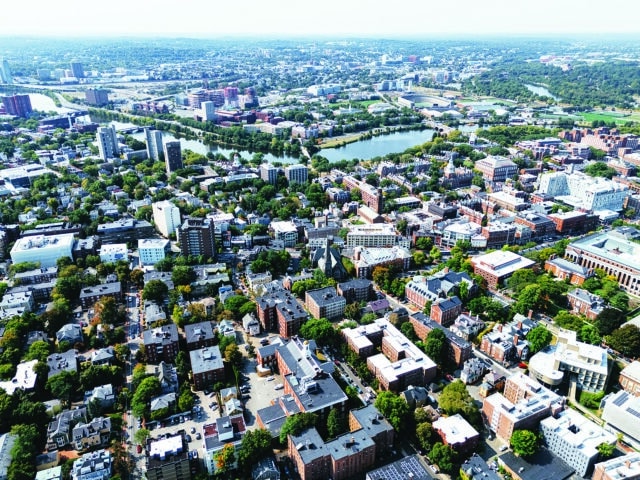
WinnDevelopment took advantage of Cambridge’s affordable housing zoning overlay to propose 95 apartments next to its Walden Square housing complex in West Cambridge. Image courtesy of Prellwitz Chilinski Associates
The city of Cambridge handed affordable housing developers a powerful tool by rezoning the entire city to allow multifamily projects that reserve all units for income-restricted households.
In a city known both for its progressive politics and vocal defenders of neighborhoods’ status quos, developers have been walking a careful line to navigate the new permitting landscape. The results of the new ground rules enacted in 2021 and updated last year have revived some controversial projects and made other sites more attractive to developers for large-scale projects.
But expectations of a fast-track to groundbreaking are elusive despite Cambridge’s still-rising housing costs, as developers revise designs and reduce some projects’ size.
“These are not cheap reworks, and they do take a lot of time,” said Matthew Robayna, a development consultant for WinnDevelopment, which is proposing 95 apartments next to an existing apartment complex on Walden Square Road. “Compared to other communities, the city is expecting a fairly high level of detail on drawings, and our soft costs have increased pretty dramatically during the process.”
WinnCompanies began its community outreach in 2021. Since then, it’s redesigned the Walden Square II complex from one building to two, reducing the length of a building section that sits over a private way and community path in response to public comments.
“There’s been a lot of resistance,” Cambridge Vice Mayor Marc McGovern said. “To their credit, they have taken their time – which is costing them money – to revise their plans and try to figure out something that people feel better about.”
Related Story:
Cambridge Weighs 4-Story Compromise on Upzoning
Federico Muchnik, a former city council candidate and leader of a campaign opposing the Walden Square project, dismisses WinnDevelopment’s changes as window-dressing.
“All we have is public opinion, because the law is not on our side,” Muchnik said. “They have played the humble card, but the truth is they are just waging a campaign to get this done and to push it through. They don’t really have to listen to any of us, including ideas for a third design, or even just go away and making their money somewhere else.”
WinnDevelopment’s Robayna frames the effects of the rezoning in a different light.
“The benefit is: Even for a project that is not unanimously supported across the community, it provides a path forward to get it to happen,” he said.
Mass Ave. Project Revived by Capstone
Newton-based Capstone Communities and its partners are cautiously optimistic that a long-delayed housing project outside Porter Square will be approved under the affordable overlay. A previous proposal for a 48-unit housing project was withdrawn in 2021, amid opposition from Zoning Board of Appeals members and neighbors.
Capstone is preparing to submit a new proposal for a building up to 12 stories at 2072 Massachusetts Ave., a vacant former restaurant and parking lot.
“We’re treating it like a normal permitting process, where we’ve tried to solicit feedback from the community and we will continue to do so,” Capstone Communities’ Principal Jason Korb said.

Cambridge’s affordable housing overlay zoning allows up to 15-story buildings in Harvard Square – but only in theory. iStock photo
Capstone is partnering with HOPE Real Estate Enterprises and MPZ Development on the project, which has held two community meetings to fine-tune its final designs.
Developers are required to hold at least two community meetings and make a pair of presentations to the Planning Board, which issues a recommendation to the Cambridge Affordable Housing Trust. The trust collects funding from commercial development linkage fees and other sources, and decides whether to contribute funding to the project.
The rezoning also was a key factor in Cambridge nonprofit Just a Start’s $10.5 million acquisition this month of two Lesley University parking lots on Massachusetts Avenue. The Porter Square district allows building heights up to 12 stories.
Permitting Reviews Can Stretch for Years
More than 700 affordable units have been approved or are under construction under the overlay, approved in 2021 and updated in 2023 to allow taller building heights up to 15 stories or 170 feet in main business districts and 12 or 140 feet stories along major corridors.
Supporters say the 100 percent affordable overlay has addressed decades of exclusionary zoning that concentrated poverty and minority populations in a handful of areas. Firms including Capstone Communities, B’nai Brith Housing and Homeowners Rehab all are pursuing projects that would add hundreds of units in sections of West Cambridge.
But many projects still face lengthy permitting reviews, despite overlay backers’ stated goal of shortening the process.

Steve Adams
Developers still have to present design schemes for review by the Planning Board, ranging from building materials and architectural styles to shadow effects and landscaping plans. Some developers have shrunk buildings in response to neighborhood objections to heights.
At 28-30 Wendell St. outside Harvard Square, Cambridge-based developer Homeowner’s Rehab Inc. agreed to reduce the height of a planned apartment building from 9 to 8 stories after neighbors objected to its preliminary design.
“I wasn’t happy about the height coming down, because that’s more of our potential neighbors,” City Councilor Sumbul Siddiqui said in an interview. “But HRI decided to do that, and they want to be a good neighbor.”
Councilor Burhan Azeem echoed Siddiqui’s disappointment about the loss of 15 affordable units at the project.
“People are nervous when it’s by-right [approval] that it means there will be no feedback,” Azeem said. “The city and our affordable housing partners do care about feedback, but the by-right is important because you’re going to spend your money on designs, not lawyers to get it through court.”








